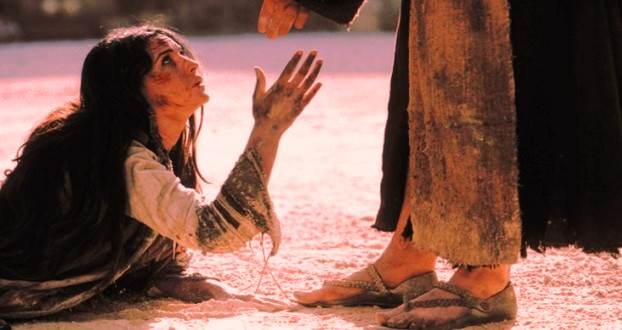This Sinner Had Her Dignity Restored

(By Fr. Dexter Brereton)
Jesus restores the dignity of this sinner caught in the act of adultery
[simpleazon-image align=”left” asin=”0399588639″ locale=”us” height=”375″ src=”http://ecx.images-amazon.com/images/I/51IWchP4K2L.jpg” width=”254″]These were disgusting people. The men who hauled the woman ‘caught in adultery’ in today’s gospel story were simply trying to make a point. There may have been no real prospect of the woman actually being stoned to death since, as we learn at the trial of Jesus, Rome had taken away the power of the Jews to carry out capital punishment. But for the sake of their hatred and resentment of Jesus of Nazareth, this poor unfortunate sinner finds herself a pawn in a deadly game, a victim of ‘woman-blaming-and-shaming.’ She is the only one captured in a crime that normally requires two accomplices! Where was her (probably male, probably married) partner?
Two phrases jumped out at me in this reading. At the beginning, when the woman caught in adultery is hauled before Jesus by the scribes and Pharisees, St John uses the expression: “…and making her stand there in full view of everybody…” We here in Trinidad and Tobago have had a long history of making women ‘stand there in full view of everybody.’ Recently we heard the case of a Japanese pannist who was murdered during the carnival celebrations, being somehow associated with the lewdness and vulgarity that had crept into the carnival, in the process permanently staining her reputation. But long before Ms. Nagakiya’s murder, there was Jean, Dinah, Marabunta Jean, Eve, Melda and a host of other women whose sexuality was criticized and ridiculed in song by our prominent calypsonians, for no other reason than the fact that their exploits rivaled and surpassed those of the male calypsonian who frequented the same underworld. Today, we continue to make the woman stand there in full view of everybody, only, this time the ‘woman’ may be a crime-riddled lower-class community, or an entire race of people that others may label or stigmatize as ‘naturally prone to crime’ – the same kind of crime committed by members of other communities.
The last conversation between Jesus and the woman is also noteworthy: He looked up and said, ‘Woman, where are they? Has no one condemned you?’ No one sir, she replied. ‘Neither do I condemn you,’ said Jesus, ‘Go away and don’t sin anymore.’ Jesus very gently allows the woman to recover her dignity and she is able to leave without having a sermon preached at her. Jesus is not interested in the ‘shaming’ game that the scribes and Pharisees were involved in. Nor is he interested in her sin. He invests his time in giving her back her freedom and her dignity.
Question for reflection: When someone who does wrong is reported to me, am I more interested in scolding the sinner or in helping them find their way back to God? In which one do I invest my time?
Prayer
Lord, we thank you for your word. We praise you for your gentleness with this poor sinner whom you allowed to recover her dignity. We pray that in our dealings with others, especially with those who do wrong, we may act in similar ways, and invest in freeing others instead of scolding them. We repent Lord, for every time, we in our turn have made others ‘stand there in full view of everyone.’ We are sorry for our own participation in the shaming and labeling of others especially the poor sinner. Grant us merciful hearts, O Lord. Amen.






